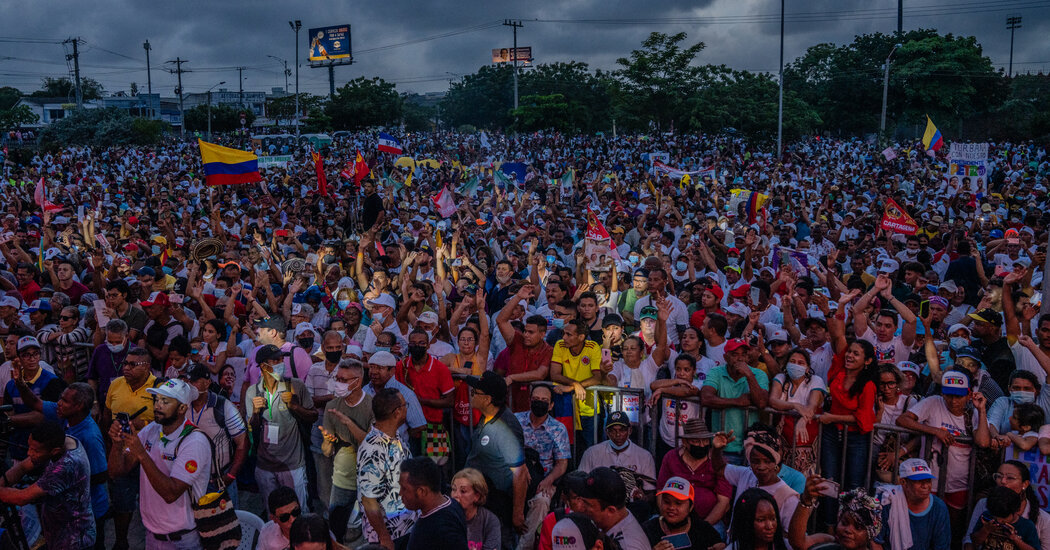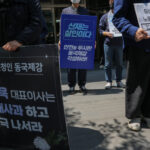
A large and loud youth electorate hungry to transform one of Latin America’s most unequal societies could propel Gustavo Petro, a former rebel, to the presidency.
FUSAGASUGÁ, Colombia — The man onstage surrounded by a screaming, sweating, fawning crowd seemed like an odd choice for a youth icon. Gustavo Petro is gray-haired, 62, and, in his speeches, he’s more roaring preacher than conversational TikTok star.
But after an improbable rise from clandestine rebel to Bogotá mayor and bullish face of the Colombian opposition, Mr. Petro could soon become the country’s first leftist president, a watershed moment for one of the most politically conservative societies in Latin America.
And his ascent has, in no small part, been propelled by the biggest, loudest and possibly angriest youth electorate in Colombia’s history, demanding the transformation of a country long cleaved by deep social and racial inequality.
There are now nearly nine million Colombian voters 28 or younger, the most in history, and a quarter of the electorate. They are restive, raised on promises of higher education and good jobs, disillusioned by current prospects, more digitally connected and arguably more empowered than any previous generation.
“Petro is change,” said Camila Riveros, 30, wrapped in a Colombian flag at a campaign event this month outside Bogotá, the capital. “People are tired of eating dirt.”
As Colombians prepare to vote on Sunday, Mr. Petro has promised to overhaul the country’s capitalist economic model and vastly expand social programs, pledging to introduce guaranteed work with a basic income, shift the country to a publicly controlled health system and increase access to higher education, in part by raising taxes on the rich.
Mr. Petro has been ahead in the polls for months — though surveys suggest he will face a runoff in June — and his popularity reflects both leftist gains across Latin America and an anti-incumbent fervor that has intensified as the pandemic has battered the region.
“We have a decision to make,” Mr. Petro said at another campaign event this month in the Caribbean city of Cartagena. “We maintain things the way they are, or we scream: Freedom!”
But critics say Mr. Petro is ill-suited for office, arguing that his policies, which include a plan to halt all new oil exploration in a country where fuel is a critical export, would ruin the economy.
He has also taken direct swings at the country’s major institutions — most notably the armed forces — escalating tensions with military leaders and leading to concerns about the stability of Colombia’s longstanding but vulnerable democracy.
Mr. Petro’s main opponent, Federico Gutiérrez, 47, a former mayor of Medellín, the country’s second largest city, and the candidate of the conservative establishment, proposes a more modest path forward.
“Of course we need to change many things,” he said in an interview, citing a plan that would ramp up fracking for oil, steer more money to local governments and create a special unit to fight urban crime. “But changes can never mean a leap into the void without a parachute.”
A third candidate, Rodolfo Hernández, 77, a former mayor with a populist, anti-corruption platform has been climbing in the polls.
The election comes at a difficult moment for the country. Polls show widespread dissatisfaction with the government of the current president, Iván Duque, who is backed by the same political coalition as Mr. Gutiérrez, and frustration over chronic poverty, a widening income gap and insecurity, all of which have worsened during the pandemic.
Among those hurt the most by these problems are younger Colombians, who are likely to play a big role in determining whether the country takes a major lurch to the left.
Young people led anti-government protests that filled the streets of Colombia last year, dominating the national conversation for weeks. At least 46 people died — many of them young, unarmed protesters and many at the hands of the police — in what became referred to as the “national strike.”
Some analysts expect young people to vote in record numbers, energized not just by Mr. Petro, but by his running mate, Francia Márquez, 40, an environmental activist with a gender, race and class-conscious focus who would be the country’s first Black vice president.
“The TikTok generation that is very connected to Francia, that is very connected to Petro, is going to be decisive,” said Fernando Posada, 30, a political analyst.
Today’s younger generation is the most educated in Colombian history, but is also grappling with 10 percent annual inflation, a 20 percent youth unemployment rate and a 40 percent poverty rate. Many — both supporters and critics of Mr. Petro — say they feel betrayed by decades of leaders who have promised opportunity but delivered little.
In a May poll by the firm Invamer, more than 53 percent of voters ages 18 to 24 and about 45 percent of voters ages 25 to 34 said they were planning to vote for Mr. Petro. In both age categories, less than half those numbers said they would vote for Mr. Gutierrez or Mr. Hernández.
Natalia Arévalo, 30, a single mother of three, marched for days during protests last year, with her daughter, Lizeth, 10, wearing a placard around her neck that read: “What awaits us children?”
“You have to choose between paying your debts and feeding your kids,” said Ms. Arévalo, who supports Mr. Petro.
“You can’t eat eggs, you can’t eat meat, you can’t eat anything,” she added. “We have to give a 180-degree turn to all that we’ve had for the last 20 years.”
To be sure, many young voters are skeptical of Mr. Petro’s ability to deliver on his promises.
In Fusagasugá, Nina Cruz, 27, a cafe worker, said Mr. Petro would fail Colombia’s struggling families, and she was particularly repulsed by his past as a member of a leftist rebel group.
The country has a long a history of violent militias that claim to help the indigent — and end up terrorizing them.
“What he is saying is: ‘I’m going to help the poor,’” she said. “That’s a total lie.”
Mr. Petro, an economist, grew up outside Bogotá. As a teenager, he joined the M-19, a leftist urban militia that sought to seize power and claimed to promote social justice.
The group was never as large or as violent as the country’s main guerrilla force, the Revolutionary Armed Forces of Colombia, or FARC. But in 1985, the M-19 occupied a national judicial building, sparking a battle with the police and the military that left 94 people dead.
Mr. Petro, who did not participate in the takeover, ended up in prison for his involvement with the group.
He eventually demobilized and ran for a senate seat, emerging as the combative face of the left, pushing open conversations about corruption and wrongdoing.
Some critics have warned that Mr. Petro’s energy proposals would bankrupt the country. Oil represents 40 percent of Colombia’s exports and Juan Carlos Echeverry, a former finance minister, has said that halting oil exploration “would be economic suicide.’’
Mr. Petro also has a reputation for an authoritarian streak. As mayor of Bogotá, he circumvented the City Council and often failed to listen to advisers, said Daniel Garcia-Peña, who worked with Mr. Petro for a decade before quitting in 2012. In his resignation letter Mr. Garcia-Peña called Mr. Petro “a despot.”
The election comes as polls show growing distrust in the country’s democratic institutions, including the country’s national registrar, an election body that bungled the initial vote count in a congressional election in March.
The error, which the registrar called procedural, has led to concerns that losing candidates will declare fraud, setting off a legitimacy crisis.
The country is also being roiled by rising violence, threatening to undermine the democratic process. The Mission for Electoral Observation, a local group, called this pre-election period the most violent in 12 years.
Candidates pushing change have been murdered on the campaign trail before.
Both Mr. Petro and Ms. Márquez have received death threats, and at his campaign event in Cartagena, he took the stage flanked by men holding bulletproof shields.
Some voters held signs that read “Black children’s lives matter,” and “if it’s not Petro, we’re screwed.”
There was excitement — but also trepidation.
“What we want are opportunities for everyone,” said Lauren Jiménez, 21, a university student.
But “if Petro can’t follow through, I know we will see the same thing that happened with the Duque government: a social explosion,” she warned. “Because we’re tired of staying quiet.”
Sofía Villamil contributed reporting from Bogotá, and Federico Rios from Cartagena.




